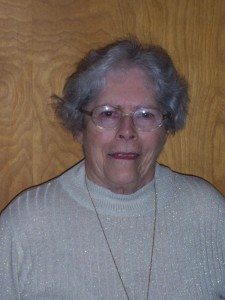
Georgia Linscheid describes herself as a “thoroughbred Mennonite,” with ancestors from the Old Country who became pioneer farmers in the U.S. Midwest. She grew up in a Mennonite community in Ohio, on an Amish-like farm with no machinery and a main house that was 150 years old. Despite her graying hair, Georgia still retains the fresh complexion, clear eyes, open expression and physical vitality stereotypically associated with her regional origins.
But Georgia was never a provincial farm girl. Very much the pioneer in her own right, Georgia began expanding her horizons as a collegian, opting to spend a year as an exchange student in a sister Mennonite school in Kansas. After graduating back in Ohio, she returned to Kansas via the Mennonite volunteer program, the Missionary Training Center (MTC), to work in a mental hospital alongside a bunch of Mennonite conscientious objectors doing alternative service. When the well-known Menninger Foundation took over the state mental hospital in Topeka, they initiated a training program for the new position of “psych aide” and Georgia was among the first enrollees. Then when MTC began to open its own psych hospitals, Georgia was primed to work for them. She had an eye for a hospital in Pennsylvania, but when they told her they really needed her in a small California town, she agreed to move to Reedley and drove out alone in her old ’46 Ford. A couple of years later, the car changed her life again: She was asked to pick up a new recruit at the bus stop…and there began the still-enduring team of Allen and Georgia Linscheid. Together and separately they have performed innumerable and innovative roles in public service, earning the respect and gratitude of their fellow citizens.
Eventually, Georgia’s focus shifted to gerontology. As a member of her church board, she helped with the planning of a nursing home. Then, while the Linscheids were in Palo Alto for Allen’s master’s degree program, Georgia picked up on a new idea in the world of gerontology—the “senior activity center.” Back in Reedley, she embarked on the mission to create such a center in Fresno…and thus began the era of Georgia the community organizer and political lobbyist. Moving from success to success, she helped organize a large-scale three-county Senior Citizen Day, a fair to provide information and recruit a cadre of lobbyists; and then she helped create a Fresno County Commission on Aging, with an office in Reedley.
Switching gears, Georgia became involved with the Reedley Historical Society and worked to establish the Reedley Museum. In this context, she became familiar with the history and culture of the Choinumni tribe native to the region. She met and was befriended by tribal elder Angie Osborne and began assisting with the tribe’s efforts to gain federal recognition.
Comfortable by now in the role of organizer and public figure, Georgia played an important part in the successful effort to keep Walmart out of Reedley. Also, at the time of the first Gulf War (circa 1992) Georgia participated in antiwar demonstrations at Reedley College and, having joined a church study group, began moving from the biblical literalism in which she was raised. Studying the teachings of Jesus and Gandhi, she entered into an understanding of active nonviolence as a force for justice. With colleagues like Pearl Jantzen, Kathy Rattinger and Margaret Hudson leading the way, the group adopted a new motto: “Let’s stop talking and do it.”
The study group slowly morphed into a peace center based at the First Mennonite Church, with Georgia as an active figure in its evolution. Now a community fixture, in addition to sponsoring regular antiwar demonstrations the Center hosts an amazing array of speakers and films every Friday, typically gathering 50–100 participants. The Reedley Peace Center also has become a vital and reliable ally for progressive causes and actions throughout our valley.
Most recently, Georgia has entered full-force into another endeavor: Save Jesse Morrow Mountain. Spurred equally by her relationship with the Choinumni people (who hold the mountain sacred) and her outrage at the ecological and aesthetic barbarity of the plan to decapitate the mountain to mine for gravel, Georgia has become a key organizer and spokesperson. She recently managed a PR coup by convincing a visiting journalist to look into the story. This maneuver resulted in a front-page story in the Los Angeles Times that garnered state-wide attention. But progress is uncertain. “My colleagues on the steering committee tend to be mostly concerned with the impact on their personal property, and they’re timid about taking action. But I’ve read Greg Mortensen’s ‘Three Cups of Tea’ [about building schools in Afghanistan, ed.] and I’m learning about patience.” Georgia has also been inspired by Pete Seeger’s work to reclaim the Hudson River; and knowing the power of Seeger’s music as an organizing tool, she thought, “Let’s save the mountain with songs.” Enlisting the Raging Grannies to perform, Georgia has written a bunch of songs (or, more accurately, written new lyrics for old tunes) and produced a CD called Save Jesse Morrow. The CD can be purchased by contacting Georgia at geolinsch@verizon.net.
Georgia Linscheid epitomizes a strand of progressivism not often represented in our media. Acting with quiet determination born of her religious faith and pioneering spirit, she has moved continually past boundaries of tradition and comfort. Without bitterness or confrontation, she has sought out places where neglect and short-sightedness have caused injustice and misery, offering her concern, attention and ingenuity. She says simply, “The best teaching I’ve received is to accept everyone for who they are and help them when needed as you can.” With a life-partner moved by a like spirit, it is not surprising to learn that Allen and Georgia Linscheid often have been honored by their colleagues, most recently being selected as King and Queen of the 2010 Reedley Fiesta.
